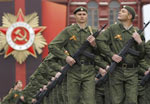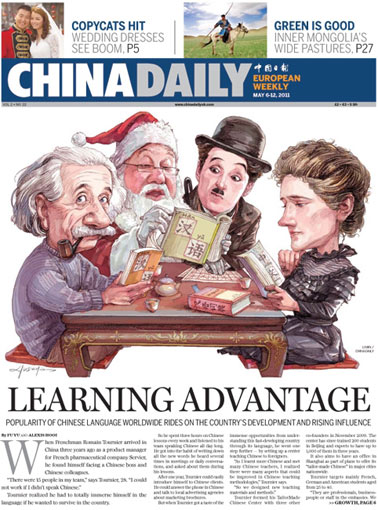People
An inspired first lady
Updated: 2011-05-09 07:55
By Lin Qi (China Daily)
|
Soong Ching Ling with young actors and actresses from the children's theater she founded in Shanghai. Provided to China Daily |
Exposed to Western notions of democracy and equality at a young age, Soong Ching Ling made seminal contributions to help realize the dreams of her husband, Sun Yat-sen. Lin Qi reports.
May 29 marks the 30th anniversary of the death of Soong Ching Ling (1893-1981). Also known as Madame Sun Yat-sen, Ching Ling made great contributions to the Chinese revolution and the founding of the People's Republic of China. The three Soong sisters, along with their husbands, were among the nation's most significant political figures of the early 20th century.
Edgar Snow (1905-1972), one of the most notable Western journalists to report on China in both the revolutionary and post-revolutionary periods, once wrote of Ching Ling:
"Her braveness and royalty, and the beauty of her spirit was the most beautiful and brilliant symbol of China."
Born at a time when China's feudalism was on the verge of collapse, Ching Ling inherited from her father Soong Yaoru (1863-1918), or Charlie Soong, a passion for democracy.
Unlike her father, called "a revolutionary keeping his identity hidden" by Sun Yat-sen (1866-1925), Ching Ling participated actively in Sun's political world, bravely facing threats and dangers.
Throughout her lifetime, she lived up to her oath, made after Sun's death in 1925, that "I must do my utmost and encourage others to continue the cause of my husband".
A native of Shanghai, Ching Ling was the second daughter of a wealthy businessman and Methodist minister, who had spent some 15 years in the United States. The mother, Kwei Twang Nyi (Ni Guizhen) (1869-1931), a devout Christian and a strict disciplinarian, gave Ching Ling, who most looked like her, a Christian name - Rosamonde.
At a time when children of other families were being fed the doctrines of Confucius and Mencius and the view that men were superior to women, the young Ching Ling came into contact with the Western world and its ideas of democracy and gender equality.
In 1908, she entered the Wesleyan Female College (In 1917 the word "Female" was eliminated from the title, and the school assumed its present name of Wesleyan College) in Macon, Georgia, in the US, where she was further nurtured by democratic traditions. She believed her own country was badly in need of the spirit of democracy at that time.
She empathized with the success of the 1911 Xinhai Revolution that overthrew the Qing Dynasty (1644-1911). Her father, who attended Sun's swearing-in ceremony as the provisional president of the Republic of China, sent her a flag of the Republic. She ripped off the Qing flag in the classroom and with great excitement, hung the new one. She praised the revolution ardently in an essay in the college's journal, expressing pride for her country and people.
Following her graduation from Wesleyan in 1913, she returned to China and stopped over in Japan. There she met the 47-year-old Sun Yat-sen, who was suffering setbacks in his cause and seeking asylum in Japan.
Ching Ling took over the work of her older sister Soong Ai-ling (1889-1973) as Sun's English secretary. Special feelings grew between the two despite their great age disparity and Sun got a divorce. They two married two years later in Tokyo, opposed by Ching Ling's parents and Sun's fellow revolutionaries. The bride later wrote to an alumnus at Wesleyan that, "I am happy and I try to help my husband as much as possible with his English correspondence. So you may say marriage for me is like going to school except that there are no exams to trouble me".
As she drifted with Sun from place to place, Ching Ling gained a deeper understandings of her husband and the revolution. She was inspired by Sun's dauntless spirit and his struggle to secure China's future. She had turned into a true revolutionary.
After Sun ended his exile abroad and returned to China in 1916, he decided to transform the Kuomintang into a stronger revolutionary party by uniting with the Communist forces. As his secretary and aide, Ching Ling took part in the decision-making process.
She accompanied Sun to meetings with Li Dazhao (1888-1927), co-founder of the Communist Party of China (CPC) in 1921, to discuss cooperation between the two sides. She was in charge of contacts between Sun and representatives of the Soviet Union government in the 1920s.
She also cared for Sun like a nurse when he was severely ill in Beijing. After her husband died in 1925, she carried on his work. She was elected a member of the central executive committee at the second assembly of the Kuomintang, in Guangzhou, 1926. She then devoted herself to publicizing Sun's testament and desire to build a democratic republic in China.
When the right-wingers of the Kuomintang betrayed Sun's revolutionary principles and placed sanctions on the Communists, she stated that unless the Kuomintang government changed its policies, she would not take part in any of its activities. Before she made a trip in 1928 to Germany from the Soviet Union, where she had stayed since 1927, she sent Chiang Kai-shek (1887-1975) a telegraph saying, "I'm moving forward by following the footprints of revolutionaries. This is the only route cherishing the memories of our leader. I'll never turn back from this road".
In 1933, Ching Ling co-founded the China Alliance for Civil Rights, which protected many revolutionaries and underground Communists from the "White Terror" unleashed by the Kuomintang government. When she came to know that the Communist base in Yan'an needed a journalist and a doctor, she immediately thought of her friends Edgar Snow and George Hatem (1910-1988) and helped send them to Yan'an.
Ching Ling was on the frontline to salute Chinese troops and raise money for the wounded after the Japanese army invaded China in the 1930s. Israel Epstein (1915-2005) first met her in Guangzhou when he, then 22, was sent by the United Press International to cover the war in China in 1937.
"When I first saw her, she was marching in a parade against Japanese aggression. It was a very dangerous thing to do because Guangzhou was near Japanese airplane bases. The planes came from the base to Guangzhou within 15 minutes, and there was very often no warning of bombing," he recalled.
During her stay in Hong Kong, she initiated the China Defense League (now the China Welfare Institute), putting people with different views together in the fight against the invaders.
She launched "A Bowl of Rice" campaign in 1941, which called for diners and restaurants to pay generously for a bowl of rice so war refugees could be fed, and to encourage people to save food and clothing. Her efforts took the movement to the US, and people there too donated for China's war against fascism.
She sided with the CPC during the War of Liberation (1945-49) and provided great material support to the Chinese People's Liberation Army. She was elected vice chairperson of the People's Central Government when New China was founded in 1949. She served the socialist revolution and construction to the last breath of her life.
Describing her feelings at the founding ceremony of New China, she said "I know this time it will never turn back and never reverse. This time, Sun Yat-sen's effort has at last yielded fruit, and the fruit looks so beautiful".
Ching Ling was deeply concerned about women. She ran a women's institute of political training in Hankou, Hubei province in 1927. In December 1949, she was elected honorary president of the All-China Women's Federation.
Although she had no children, she cared passionately for youth, founding children's welfare institutions, schools and an art troupe and theater for children, as well as New China's first children's magazine.
|
A visitor offers flowers to the stone statue of Soong Ching Ling at her former residence in Shanghai. Gao Erqiang / China Daily |
E-paper

War of the roses
European Chinese rose growers are beating their Chinese rivals at their own game
High-tech park gets big boost
At the source
Merchant of Venice
Specials

Sino-US Dialogue
China and the US hold the third round of the Strategic and Economic Dialogue on May 9-10 in Washington.

Drunk driving
Drunk drivers face a detention for one to six months and a revokation of their drivers' license.

V-Day parade
A military parade marking the 66th anniversary of the Soviet victory over Nazi.


